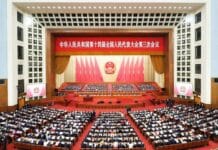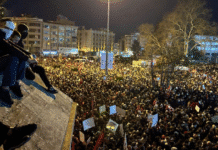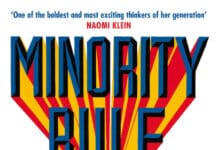Unofficial memoirs of top Chinese leader fill important gaps in our knowledge
Reviewed by Vincent Kolo, chinaworker.info
The circumstances under which ‘Prisoner of the State’ was written [the Chinese original appears under the title ‘Journey of the Reforms’] are quite dramatic, perhaps more so than the book itself. But as the first ever unsanctioned account by a one-time leader of the world’s biggest Communist [Stalinist] Party, ‘Prisoner of the State’ is a historical document. It is an unusually candid account due to the persecution of the author by the government he once led after the Tiananmen events of 1989, and the fact the book has not been ‘processed’ by the ruling party’s propaganda department. While the book does not contain much we did not know already, Zhao’s testimony lends weight to suppositions and interpretations of events that observers of recent Chinese history, particularly socialists and opponents of the dictatorship, have made on the basis of other data. In places, the memoirs are a devestating critique of Deng Xiaoping and the other architects of today’s China, a group that includes the author himself.
Zhao was General Secretary of China’s Communist Party (CCP), formally the top position in the state, from 1987-89, following his years as Premier 1980-87, which in the Chinese governmental system means controlling economic policy (a combination of the roles of Prime Minister and Finance Minister in Western countries). He was deposed in June 1989 after he refused to back Deng Xiaoping’s use of ‘shock and awe’ military force to crush the mass movement for democracy that had gripped China for two whole months. Zhao spent the remainder of his years until his death in 2005 under house arrest in Beijing. This is where he recorded his memoirs surreptitiously, employing genial methods to prevent the household servants employed by the party-state to spy upon him from discovering and foiling this project.
A subversive book
In this subversive enterprise, conducted over eight years, he was aided and spurred on by a number of prominent retired CCP officials. The tape recorder Zhao used was given to him by former Guangdong party boss, Lin Ruo. Zhao made around thirty cassette tapes, disguising them as stories for his grandchildren. Others who helped Zhao were Xiao Hongda, former vice head of the party’s disciplinary commission, Yao Xihua, former editor-in-chief of Guangming Daily, and Du Xingyuan, former secretary of the State Council [China’s cabinet]. These and other allies paid regular visits and staged fake discussions to conceal the fact Zhao was making recordings. “The guards would have been alerted hearing Zhao talking to himself,” explained Bao Tong, another close ally who was Zhao’s former top aide and served a seven year prison term after the 1989 Beijing massacre. After Zhao’s death, the tapes were smuggled abroad and transcribed by Bao Pu, the son of Bao Tong. Reflecting a surge in interest in the 1989 events, ‘Prisoner of the State’ sold out in Hong Kong even before its official release date.
True to form, the mainland Chinese media ignored the book altogether, but their Hong Kong outlets were sufficiently rattled by the huge public interest to launch a rare attack. One week before the twentieth anniversary of the massacre, on June 4 1989, they accused western media of “ballyhooing” Zhao’s book. Zhao leaves us in no doubt that it was Deng personally who ordered the June 4 crackdown. This is hardly news, but in common with much else in this book, Zhao’s testimony settles the matter. Invaluable in this respect are one or two insights into the psychology of the ruling group at critical moments. The 1986 student demonstrations in Shanghai and a dozen other cities, “shocked Deng Xiaoping” says Zhao, revealing that even at that time Deng considered a military response. The 1986 protests were a forerunner of the Tiananmen movement. The depth of the crisis within the regime during the 1989 movement is shown by the comments of security chief Qiao Shi, who told Zhao: “Quite a number of people [in government] are feeling like they are ‘riding a tiger, unable to get off’” According to Zhao, Premier Li Peng, a key figure behind the crackdown, was terrified when he went to Tiananmen Square to meet hunger-striking students and couldn’t leave fast enough!
A contradictory figure
Zhao emerges in these memoirs as a contradictory figure, a ‘pragmatist’ who could move in one direction or another without deeper principals. In one passage he describes Mao and Stalin as “great leaders”. In another, he confesses – and this is quite a confession from the former head of the world’s biggest Stalinist bureaucracy – that, “The democratic systems of our socialist nations are all superficial; they are not systems in which people are in charge, but rather are ruled by a few or even a single person.”
Genuine Marxists reject the notion that China or the Soviet Union were ever ‘socialist nations’. This was the claim of the ruling bureaucracies in order to justify their lavish privileges and the dictatorial and ultimately destructive control they exercised over the planned state-owned economies. Despite Zhao’s complaints about “concentration of power in, and arbitrary use of power by, a single person,” his track record was one of serving and defending this system. Repeatedly in these memoirs he refers to Deng Xiaoping, who rose to power in 1978, as China’s “ultimate decision maker”. Although by the late 1980s Deng had taken a step backwards, ‘only’ retaining the chairmanship of the Central Military Commission (i.e. control of the army), Zhao relates that Deng had the final word in all matters: “That was it; he [Deng] had made it final”… “the crux of the issue was Deng Xiaoping himself…” etc. Zhao also makes clear that Deng’s own attacks on bureaucratism and “overconcentration of power” were no more than politicking aimed at bringing down and replacing his predecessor – Mao’s chosen heir – Hua Guofeng. As a result of such statements made during the late 1970s power struggle, Deng gained a reputation as a ‘political reformer’ (an advocate of relaxing authoritarian controls) that lacked any basis in reality.
Debunking Zhao myths
Zhao has earned a special place in the history of the 1989 movement for his refusal to back the decision to impose martial law, this cost him his job and his personal liberty. Zhao’s rejection in the mid-1990s of an offer of rehabilitation – and freedom – if he would make a public endorsement of the Tiananmen crackdown, has further endeared him to democracy fighters in China including a new generation too young to have witnessed the 1989 events. The aura of ‘compassionate official’ that surrounds Zhao has been reinforced by the publication of the book on the eve of this year’s twentieth anniversary, which saw the 200,000 people take part in the biggest ever candle-lit vigil in Hong Kong. Without detracting from the importance of this book, this reviewer would like to set the historical record straight as to Zhao’s role in 1989. He did not support the mass protests, which by drawing millions into the arena of struggle threatened to develop into a political revolution against the ‘communist’ bureaucracy’s rule. In reality, Zhao adopted an ambivalent position towards this movement. Especially once the movement had begun to arouse significant sections of the working class, a far more serious and powerful theat to the ruling group, Zhao made repeated attempts to get the student leaders to call off the protests and return to their studies.
Even Zhao’s opposition to the use of repression against the movement must be qualified. His memoirs include a letter he sent to Deng on the eve of the declaration of martial law, urging the paramount leader to revoke the April 26 editorial in People’s Daily, that venomously attacked the students but enraged the masses rather than subduing them. Zhao’s letter contains the following revealing passage: “Even if you must eventually take some resolute measures to maintain order, we must take this first step. Otherwise, imposing harsh measures while a majority of people are adamantly opposed may result in serious repercussions that threaten the fate of the party and the state.”
From this it’s clear that Zhao was not opposed in principle to “harsh measures”; his difference of opinion with Deng and others concerned how such measures should be applied, fearing the consequences of Deng’s line. Zhao favoured offering concessions to the protests, which boiled down to, “concrete steps in the direction of opening dialogue and reducing tensions”. When he lists his “concrete steps”, however, they fall far short of what the students, let alone the workers, were fighting for. Zhao favoured a commission against corruption to investigate abuses under the National People’s Congress (NPC) – then as now this ‘parliament’ is a purely decorative organ with no real power. Zhao argued the NPC could conduct some ‘public hearings’ to increase its transparency, and so on. In sum, Zhao’s proposals are small, piecemeal reforms that would leave the autocratic system in tact. And to see the light of day, all of this would have required the sanction of the “ultimate decision maker” Deng.
Zhao reveals that following the decision to declare martial law, taken at an unofficial meeting at Deng’s home on 17 May, which Zhao did not attend, he tendered his resignation as party general secretary. This is a most revealing episode. While refusing to be associated with the crackdown, Zhao’s position was effectively one of silent non-compliance rather than attempting to go to the masses or openly oppose Deng. When Deng’s group heard about Zhao’s resignation they sent president Yang Shangkun to prevail on Zhao to back down. “If this information leaks out, then the situation will be even worse. We should not pour gasoline on a flame,” Yang told him. This metaphor is apt. If news of Zhao’s resignation had become public at the very moment martial law was proclaimed in Beijing, this could easily have spurred the masses to even greater defiance and deepened an already deep split in the armed forces. The resignation of the General Secretary would have been interpreted as a formal party split. Given the hesitancy within the army and state apparatus at the time, this news would have strengthened those sections that did not want to enforce martial law. Zhao instructed his secretary to recall and destroy the letter of resignation. One month after this episode, Zhao was dismissed as General Secretary and placed under house arrest by the same leaders, including Yang Shangkun, who had pleaded with him not to resign. In politics, timing is everything!
Conscious advocate of capitalism
During the 1980s, Zhao and Deng, and the reform wing they headed within the Chinese bureaucracy, evolved into conscious advocates of capitalist restoration. But they disguised their intentions by deliberately adopting terminological ambiguity in order to overcome resistance within and outside the ruling party. Zhao’s memoirs make this point absolutely clear. As to when, or if, the restoration of capitalism occurred, that is a separate question. But as to the existence of the ‘subjective factor’ – a conscious capitalist restorationist faction or force – on this count the book leaves no doubt:
“The most profound realization I had about eradicating deficiencies in China’s economy was that the system had to be transformed into a market economy, and that the problem of property rights had to be resolved. That was arrived at through practical experience, only after a long series of back-and-forths,” recounts Zhao.
The adoption of capitalism as a model by Zhao, Deng and others, especially the East Asian authoritarian model of state-led capitalism that had achieved rapid GDP growth in Singapore, Taiwan and South Korea, did not emerge overnight, but as Zhao says, “after a long series of back-and-forths”. Even when Zhao masterminded the break up of Mao’s rural collectives with farm privatisation (the household responsibility system) in the early 1980s, he confesses that at first this “was to be only a temporary solution”. This shift however launched a “profound revolution… it was conducted even while most of the leaders and cadres remained skeptical.”
Zhao’s view is tendentious as on much else in the book. After years of stultifying bureaucratic control, Zhao’s farms shake-up did stimulate agricultural growth for a period, but decollectivisation was only one of several factors including importation of grain (after decades of self-imposed autarky – this allowed Chinese farms to diversify into other more suitable crops), freeing of agricultural prices, and important technological improvements making new fertilizers widely available. The initial productivity spurt slowed, however, and gave way to stagnation in much of the Chinese countryside from the late 1980s onwards. This is one reason – again there are several – for the surge in rural protests in the last decade or so. To set the historical record straight it should also be pointed out that farm collectivisation in the early 1950s, as shown by recent studies, also yielded important productivity gains that were subsequently lost when Mao insisted on pushing further with ‘super-collectivisation’ and the formation of the rural ‘communes’. This was done mainly for reasons of politics – to control the peasantry – rather than agricultural production. In other words, when collectivisation was done on a mostly voluntary basis, the result was significantly higher productivity; but when coercion was applied, real productivity fell.
Terminological ruse
These memoirs show how Zhao’s viewpoint developed towards embracing the market system. “In the 1950s,” he states, “the economic model copied [from Stalin’s USSR] was in fact a temporary economic model intended for times of war”. On the 1980s, he declares, “In practise, the reform of those years was, to be frank, the rejection and correction of the planned economy…” The adoption of Soviet-style “orthodox socialist principles” [read: bureaucratic planning] has been “a leftist mistake”. In fact, China achieved industrial growth rates of ten percent per year, based on independent western estimates, in the 1950s, which in today’s parlance would be described as a ‘miracle economy’. This gives a glimpse of the possibilities inherent in a planned economy when all society’s resources can be harnessed. But in the strangulation grip of an unelected and increasingly erratic bureaucratic layer, the planned state-owned economy in China, as in Russia, could not be fully developed and huge imbalances and problems emerged. These threatened to plunge China into endless violent political struggles, exemplified by Mao’s Cultural Revolution of the 1960s. With their own power as their only goal and no confidence in the ability of the masses to democratically plan the economy, former Stalinist leaders like Zhao and Deng turned back to history’s demolition yard in order to resurrect a form of capitalism.
Zhao confesses how in 1988, in order to fend off a challenge from party ‘conservatives’ who threatend to reverse his pro-capitalist ‘reforms’ he devised a semantic trick to confuse them. The ‘theory’ that China was in “the intitial stage of socialism” was first launched by Zhao’s one-time political ally Hu Yaobang. Zhao relaunched this idea for the crucial 1988 party congress, gaining Deng’s approval for this. The gist of this ‘theory’ is as Zhao outlines: “One possible explanation was that socialism had been implemented too early and that we needed to retrench and reinitiate democracy. Another was that China had implemented socialism without having first experienced capitalism, and so a dose of capitalism needed to be reintroduced.”
Armed with the theory of the “initial stage of socialism” the reform wing defeated the challenge from the conservatives at the congress. However, the serious economic problems that accompanied the market reforms were a major factor behind the mass protests in 1989. Zhao’s policies were instrumental in creating the China of today, and continued to influence government policy even after his fall from grace. In the final years of his life Zhao appears to have embraced western-style parliamentarism as the “only solution” to China’s problems. Even here, it should be emphasised this was not his position when he held power. At that time his ‘political reforms’, although more radical than Deng was prepared to sanction, amounted to no more than tinkering with the system of one-party rule.




